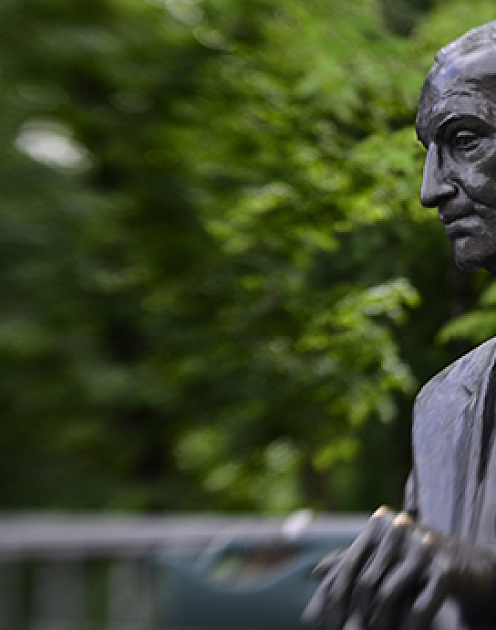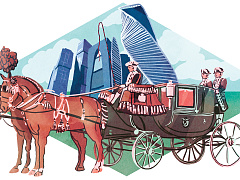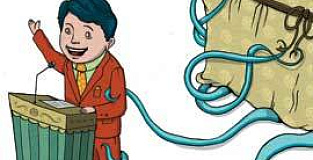This last trip comprised three days in Berlin for consulting; then a one-day visit to Minsk, the capital of Belorussia, to deliver a lecture to two hundred businessmen; then on to Odessa, Ukraine, for three days of consulting; then a full day of travel, to Bled, Slovenia, for one day to receive an honorary doctorate; then another full day of travel, to Belgrade, for three days to lecture and to receive my fifth honorary doctorate; then to Denmark to meditate for a day.
Heavy, huh? Still, meeting so many different people gives me an enormous number of ideas and insights that I know would never occur to me if I went to the same office by the same route, day after day. Creativity and stimulation happen when one crosses boundaries. Surfing the TV channels in Belorussia in the middle of the night, unable to sleep, I am learning to understand America better.
Here are my insights from this trip.
Berlin
I have lectured or consulted in Germany before. This time I was able to confirm that my earlier impression represented a pattern: Jokes, which I use to illustrate a principle or to clarify a phenomenon that I’ve noticed in my clients’ culture, do not elicit any laughter in Germany.
There are several possible explanations. One is that Germans lack a sense of humor. But I know that is not true: I see them joking and laughing during the breaks.
Another explanation is that I am the professor, and because Germans have tremendous respect for authority, they simply do not know how to react to a joke-telling professor.
But it’s also occurred to me that maybe it is because most of my jokes are Jewish jokes, and Germans might feel uncomfortable laughing at anything Jewish, fearing that their laughter could be interpreted as laughing at Jews. Germany, after all, has created museums and memorials to the Jews whom the Nazis murdered in World War II, and honors its obligation to remember the Nazis’ atrocities. Under German law, those who deny the Holocaust could go to prison.
That made me wonder about other countries that have perpetrated crimes against humanity. Countries prefer to memorialize what was done to their own, as the Israelis memorialize the Holocaust, but do other nations admit their wrong-doings and memorialize them? Is there a memorial in Russia to the millions of Ukrainian “kulaks” murdered by the Bolsheviks? Is there a memorial in Turkey to the Armenians slaughtered in 1915; or in Japan, to the Chinese killed by the Japanese army during World War II; or in Serbia, to the atrocities committed in Bosnia? We memorialize our pain, but what about the pain we inflict on others?
Continuing this thought, during the meditation retreat in Denmark it occurred to me:
There will be no peace in the Middle East (nor in my marriage, for that matter) till each of us can feel the other’s pain.
We naturally focus on our own pain and disregard the other person’s pain. We remember the pain inflicted on ourselves – without acknowledging our responsibility for the pain we have inflicted on others.
Why do the Germans memorialize the atrocities of their own people? Are they the only ones? And why? Any idea?
Another experience in Germany perplexed me: My hotel in Berlin had a very unusual shower system. All over the world, you turn the shower handle to the right to make the water cooler, and to the left to make it warmer. Well, the plumber at this hotel was apparently dyslexic. The hotel had it upside down.
I lecture in four languages, but I must have cursed in at least twelve while showering in this hotel, as I went from scalding myself to freezing every time I turned the shower handle the “wrong” way. It was a painful experience.
And what did I learn from it? When you have a change that is a major, disruptive departure from what you are accustomed to, cursing does not help. Nor does blaming the idiots who created your problem. In other words, all “internal marketing” has to stop or you will just continue to suffer, and nothing will change.
Stop; reconsider; and be one hundred percent conscious of what is going on. Do not waste any energy trying to understand or analyze the change. Forget want and should perceptions. Focus one hundred percent on what is. Accept it. Then, by freeing the energy you were using to oppose the change, you can dedicate all of your attention to learning how to navigate the new territory, where cold is now hot and hot is cold. Only then can you make it work for you.
This has implications for business, where the rules of success frequently change. For a young company, more is better: more market share, more strategic alliances, more, more, more… But the time will come when the company’s growth overtakes and then overwhelms its structure or systems. When that happens, more is not better. More is worse. One item more, and all hell breaks loose.
And that is when founders of companies often start fighting reality and blaming everyone else for their own misdeeds and difficulties. What they need to do instead is recognize that they are in a new world, which must be managed differently.
Accept the change. Stop wasting energy in denial. Benjamin Franklin once said, “The definition of insanity is doing the same thing over and over and expecting different results.” Accept the change and focus one hundred percent on learning how to handle it differently.
George Soros once said that the secret of his success was that he identified his mistakes early and corrected them early. Most of us, when we make a mistake, will deny it until it cannot be denied anymore – and then we take more time than necessary to correct it.
I wonder: Did Soros ever take a shower in my hotel in Berlin?








